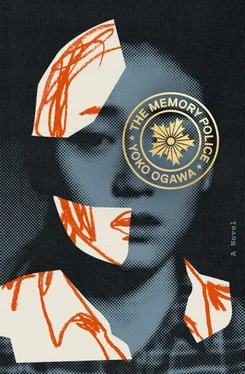“The order came three days ago. We had no time to consider what we should do. They’re offering to triple my salary, and they apparently have a school for the children. They make special provisions for everything—taxes, insurance, a car, housing. The arrangements are so generous it’s frightening.”
“Just like the letter for your mother that came fifteen years ago.”
His wife spoke up for the first time. The girl listened quietly, her head swiveling toward whoever was speaking. The boy played carefully with the sculpting tools on the table, his hands still in his gloves.
. . .
I recalled when my mother was taken away, and how the Inuis had comforted me at the time. I was just a little girl, and their daughter was a baby in her mother’s arms.
The order had come in a coarse pale purple envelope. At that point no one had heard of the Memory Police, and neither my parents nor the Inuis saw anything particularly ominous in the letter. They were just a bit anxious because it was unclear why my mother was being called or how long she would be needed.
But I had been fairly certain that it had something to do with the drawers in the chest in the basement. As the adults had stood talking about the envelope, I remembered the quiet sound of my mother’s voice as she told me stories about the secret objects—and the troubled look on her face when I had asked her why she remembered these stories and had not forgotten them like everyone else.
The discussion of the letter had ended inconclusively. There was no obvious reason to refuse.
“Everything will be fine. There’s no need to be so worried,” my mother had said.
“And we’ll help look after your house and your little girl, anything at all,” said Professor Inui, offering his support to my parents.
The car sent the next morning by the Memory Police was terribly elegant. Jet black and polished to a brilliant shine, it seemed as large as a house. The chrome wheels and door handles and the police insignia on the hood glinted in the sunlight. The leather seats looked so soft I could barely resist hopping in to try them.
The white-gloved driver opened the door for my mother. She gave a few final instructions to the Inuis and to my nurse, kissed my father, and then took my cheeks in her hands.
We were somehow reassured by the opulence of the car and the careful manners of the driver. If she was to be so well taken care of, there was no need to worry.
Mother sank down into the feather-soft seat, and we waved as if she were headed off to receive a prize at a sculpture exhibition.
But that was the last time we ever saw her alive. Her body came back to us a week later, along with her death certificate.
It listed the cause of death as a heart attack. An autopsy was performed at Professor Inui’s clinic, but nothing suspicious was found.
“A sudden illness struck her as she was helping with our classified research… We would like to offer our sincere condolences in your time of grief…”
My father read aloud from the letter the Memory Police had sent, but I understood nothing, as though I were hearing some magic formula uttered in a foreign tongue. I watched, transfixed, as my father’s tears made little stains on the lavender paper.
. . .
“The quality of the paper, the font on the typewriter, even the watermark—it was all exactly the same as the one that came for your mother.” Mrs. Inui had two scarves around her neck, knotted tightly in front. Her eyelashes fluttered as she spoke.
“Couldn’t you refuse?” I asked.
“If I do, they’ll just take me away by force,” Professor Inui answered without hesitating. “If you don’t cooperate, you become their victim. And I doubt they’d spare my family. I have no idea where they take you once they have you. Prison? A labor camp? The gallows? But you can be sure it isn’t anyplace pleasant.”
“So then you’ll go to the research center?”
“No,” said the professor, and he and his wife shook their heads in unison. “We’re going to a safe house.”
“A safe house,” I murmured, realizing this wasn’t the first time I had heard these words.
“We were lucky enough to find a group that runs them, and they’re willing to hide us. We’re going there now.”
“But you’ll be giving up your work, your whole life. Wouldn’t it be better to obey their orders? Your children are still so young.”
“I don’t think we can be sure we’d be safe, locked up in the research center. After all, it’s being run by the Memory Police. They can’t be trusted. Once I’d outlived my usefulness, I’m sure they’d do anything they felt was necessary to ensure secrecy.”
The professor had chosen his words carefully to avoid frightening the children. They were sitting quietly, behaving themselves. The boy was fiddling with a nondescript stone as though it were a toy with some elaborate hidden mechanism. His plain light blue gloves had obviously been knit by hand. They were connected to each other with a strand of yarn, to keep them from becoming separated. I remembered wearing the same kind, long ago, and, in this basement so full of anxiety, they seemed like the lone sign of innocence and peace.
“And besides, we have no intention of helping the Memory Police,” added Mrs. Inui.
“But how will you manage in hiding? What will you do for money, food, school for your children? What if one of you gets sick? What will become of you?”
There were so many things I still didn’t understand. The genetic code, decryption, the research center, the safe houses, their supporters… All these words, not yet properly defined or understood, were buzzing incessantly in my head.
“We don’t really know,” Mrs. Inui said, tears welling up in her eyes now. I knew somehow that she wasn’t actually crying. I knew somehow that she was too sad to cry—her tears were simply drops of liquid appearing of their own accord.
“It all happened so suddenly,” she continued. “We had no time. I couldn’t think about what to bring, what to leave behind. We have no way of knowing what will happen to us, so it’s all we could do to make the most immediate decisions. Should we bring our checkbook? Or did we need cash instead? What clothing should we pack? Did we need to have food? Should we leave behind Mizore, our cat?”
The drops of liquid flowed down her cheeks now without stopping. Her daughter produced a handkerchief from her pocket.
“And we had one more decision to make,” said the professor. “We had to figure out what to do with the sculptures your mother gave us. Once we vanish, the Memory Police will search our house. They may destroy much of what we’ve left behind. Which is why we wanted to protect at least a few of the things we value most—though that could prove dangerous, too. Our secret could get out. We have to limit knowledge of the safe houses to the smallest possible number of people.”
I nodded.
“I know it’s asking a lot, but we wonder whether you could keep these works your mother gave us. Until we’re able to meet again.”
As he finished, his daughter reached into the bag at her feet and, almost as if they had rehearsed the moment before showing up on my doorstep, pulled out five small sculptures and lined them up on the table.
“Your mother made this tapir for us as a wedding present. This one she gave us when our daughter was born, and the other three we received the day before she went away with the Memory Police.”
My mother had loved to sculpt tapirs, even though she had never seen one in real life. The present to their daughter was a doll with large eyes, carved in oak. I had one just like it. But the other three were different. They were abstract, puzzle-like objects made of both wood and bits of metal. Small enough to fit in the palm of your hand, they were rough to the touch, neither sanded nor varnished. It almost seemed they could be combined to form a single object, and yet the three were distinct and bore no resemblance to one another.
Читать дальше












